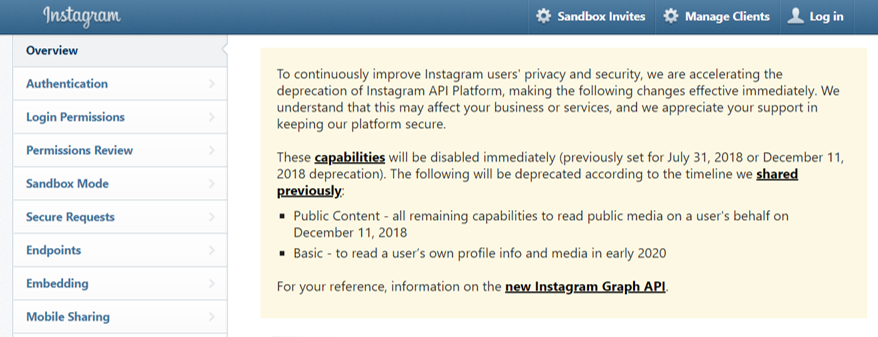At the start of social media and mainstream internet use, companies such as Facebook and Twitter made APIs available to encourage developers to add to the functionality of their website. The goal in those days was to increase adoption rates. Now that social media companies have a solid consumer base, they are starting to realize the value of data. But, how could they all of a sudden limit something that has been so readily available before? In comes GDPR.
GDPR, as mentioned in last week’s post, is intended to improve the online privacy of EU consumers. As a result, companies are required to be more transparent with their privacy policy and more conservative with transfer of personal data. Given that personal data can include anything from a picture to a status post on social media, social media companies found their ticket out of free data sharing.
 Partially due to GDPR, companies such as Instagram are rolling back the permissions of the free APIs. They are taking the opportunity to safe keep their accumulated user data and only give it out for a price (in the form of purchasing a premium API). This is a really good move for several social media companies, who are wondering how to monetize their service. While increasing revenues is behind all business decisions, that is of course not mentioned on the sites. Instead, Instagram “understands that this may affect your business or services, and we appreciate your support in keeping our platform secure.” According to the social media companies, they are rolling back API access to ensure higher security and protection for the personal data.
Partially due to GDPR, companies such as Instagram are rolling back the permissions of the free APIs. They are taking the opportunity to safe keep their accumulated user data and only give it out for a price (in the form of purchasing a premium API). This is a really good move for several social media companies, who are wondering how to monetize their service. While increasing revenues is behind all business decisions, that is of course not mentioned on the sites. Instead, Instagram “understands that this may affect your business or services, and we appreciate your support in keeping our platform secure.” According to the social media companies, they are rolling back API access to ensure higher security and protection for the personal data.
Moreover, companies got away with doing this all over the world and not just in the EU because it is rather time consuming and expensive to track the exact location of every user. Not to mention that undertaking such a calculation could undermine the performance of the website. Thus, better safe than sorry means that companies are revoking API access across the world and not merely in the EU.
Have you noticed your API permissions decrease over the past couple months? What were your work-arounds?